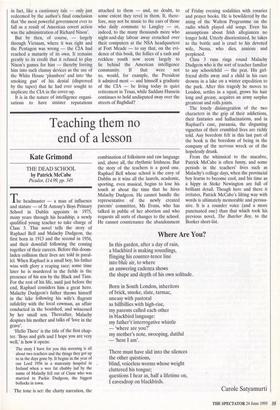Teaching them no end of a lesson
Kate Grimond
THE DEAD SCHOOL by Patrick McCabe Picador, £14.99, pp. 345 The headmaster — a man of influence and stature — of St Antony's Boys Primary School in Dublin appoints in 1975, many years through his headship, a newly qualified young teacher to take charge of Class 3. This novel tells the story of Raphael Bell and Malachy Dudgeon, the first born in 1913 and the second in 1956, and their downfall following the coming together of their careers. Before this doom- laden collision their lives are told in paral- lel. When Raphael is a small boy, his father wins with glory a reaping race; some time later he is murdered in the fields in the presence of his son by the Black and Tans. For the rest of his life, until just before the end, Raphael considers him a great hero. Malachy Dudgeon's father throws himself in the lake following his wife's flagrant infidelity with the local cowman, an affair conducted in the boatshed, and witnessed by her small son. Thereafter, Malachy despises his mother and talks of 'love in the grave'.
`Hello There' is the title of the first chap- ter. 'Boys and girls and I hope you are very well,' is how it opens:
The story I have for you this morning is all about two teachers and the things they got up to in the days gone by. It begins in the year of our Lord 1956 in a maternity hospital in Ireland when a wee fat chubby lad by the name of Malachy fell out of Cissie who was married to Packie Dudgeon, the biggest bollocks in town.
The tone is set: the chatty narration, the combination of folksiness and raw language and, above all, the rhythmic Irishness. But the story of the teachers is a good one. Raphael Bell whose school is the envy of Dublin as it wins all the laurels, academic, sporting, even musical, begins to lose his touch at about the time that he hires Malachy Dudgeon. He cannot handle the representative of the newly created parents' committee, Ms Evans, who has talked in public of her abortion and who requests all sorts of changes to the school. He cannot countenance the abandonment of Friday evening sodalities with rosaries and prayer books. He is bewildered by the axing of the Walton Programme on the radio which played old songs. Even his assumptions about Irish allegiances no longer hold. Utterly disorientated, he takes to the bottle and is cruel to his devoted wife, Nessa, who dies, anxious and perplexed.
Class 3 runs rings round Malachy Dudgeon who is the sort of teacher familiar to any schoolchild — the prat. His girl- friend drifts away and a child in his care drowns in a lake on a winter expedition to the park. After this tragedy he moves to London, settles in a squat, grows his hair long and greasy, acquires an army surplus greatcoat and rolls joints.
The lonely disintegration of the two characters in the grip of their addictions, their fantasies and hallucinations, and in Raphael's case, paranoia, the disgusting vignettes of their crumbled lives are richly told. Any boredom felt in this last part of the book is the boredom of being in the company vf the nervous wreck or of the hopelessly drunk.
From the whimsical to the macabre, Patrick McCabe is often funny, and some periods in the teachers' lives such as Malachy's college days, when the provincial boy learns to become cool, and his time as a hippy in Stoke Newington are full of brilliant detail. Though here and there it irritates, Patrick McCabe's lilting way with words is ultimately memorable and persua- sive. It is a rounder voice (and a more punctuated one) than that which took his previous novel, The Butcher Boy, to the Booker short-list.


























































 Previous page
Previous page